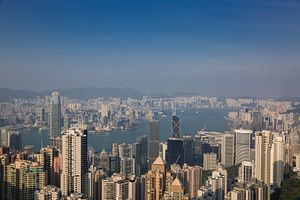Since the 1997 handover, 879,000 mainland Chinese citizens have settled in Hong Kong, where they now comprise 12 percent of the population. Waves of sociopolitical unrest, including the 2012 anti-national education assembly, the 2014 Umbrella Movement, and the 2019 anti-extradition bill demonstrations, have compounded the levels of anti-Chinese sentiment in the city. Heightened levels of Sinophobia have been largely attributed to Hong Kong citizens’ desire to protect their local identity against a perceived invasion of mainland Chinese culture, language, and values.
Despite the growing Hong Kong-mainland China tensions, President Xi Jinping on October 14, 2020 encouraged Hong Kong citizens to work and live in the Greater Bay Area, in remarks during the 40th anniversary celebration of Shenzhen’s status as a special economic zone. In so doing, Xi hopes to boost the socioeconomic integration of Hong Kong citizens into the motherland. The Greater Bay Area is a megalopolis in the southern coastal area of China, consisting of nine mainland Chinese cities, Hong Kong, and Macau. Despite the increasing regional influence of the Greater Bay Area, including the rapid financial technological development of Shenzhen, and Hong Kong’s unaffordable residential prices, Hong Kong citizens as a whole are reluctant to relocate to the mainland for the long-term.
Although Hong Kong has been experiencing an unprecedented sociopolitical divide, including anti-Hong Kong government sentiments, the city, relative to mainland China, stills offers local residents and especially citizens a desirable degree of public welfare. As core pillars of Hong Kong’s financial success in the recent decades, Hong Kong offers world-class medical and educational services, where all local residents, even without Hong Kong citizenship, can enjoy free medical consultations and therapies in public hospitals, as well as 12 years of free education in public schools. And that education is top-notch. According to the Organization for Economic Cooperation and Development’s 2018 Program for International Student Assessment, Hong Kong students ranked fourth out of 79 economies in mathematical literacy and ninth in scientific literacy.
Moreover, compared to mainland China, Hong Kong has a by far more transparent, semi-independent judicial system. This remains true despite the implementation last year of the National Security Law in Hong Kong, where mainland Chinese authorities have reportedly bypassed the city’s jurisdiction to arrest pro-democracy dissenters. In mainland China, the government is known to muzzle dissenters and critics by making them disappear, putting their families under house arrest based on trumped up charges, threatening to kill their families, and forbidding them from leaving China. These notorious law enforcement practices have significantly lowered Hong Kong citizens’ trust in the mainland Chinese legal system. The lack of trust discourages Hong Kongers from considering relocation to other cities in the Greater Bay Area, as the mainland has yet to demonstrate its willingness or efforts to maintain socio-legal justice.
These discrepancies between Hong Kong and mainland Chinese governance continue to propel Hong Kong citizens’ doubts. With the rapid economic growth in mainland China, including in Guangzhou and Shenzhen, mainland Chinese employees’ salary levels have been soaring. However, less robust social security and legal uncertainty remain major non-economic instruments that downgrade the living standards in the mainland compared to Hong Kong.
It is also noteworthy that Hong Kongers have been entitled to a relatively free flow of information. Unlike in mainland China, Hong Kong and Macau citizens can access leading Western websites and social media, including Google, YouTube, Facebook, and Twitter, as well as most, if not all, foreign academic and recreational online content. If Hong Kong citizens relocate to the mainland section of the Greater Bay Area, they will be subject to strict internet censorship and stripped off the right to free access to information – a fundamental civil right that Hong Kong citizens can hardly live without.
It is unquestionable that mainland China’s global economic influence has been rocketing in recent decades. However, Hong Kongers heavily value the non-economic benefits of living in their city. In the near future, mainland China is exceedingly unlikely to make changes that can satisfy prospective Hong Kong migrants’ expectations for a similar quality of life. As a result, Hong Kong citizens’ socioeconomic integration into mainland China may progress slowly at best.

































